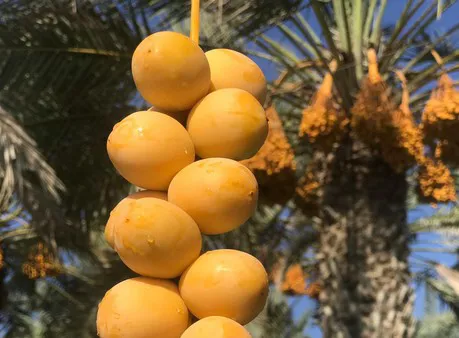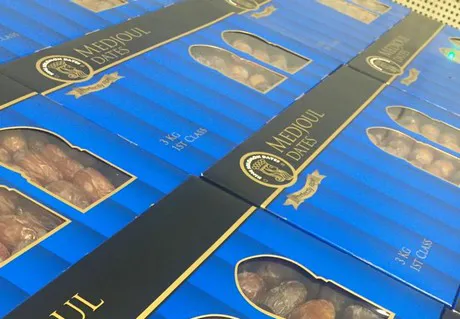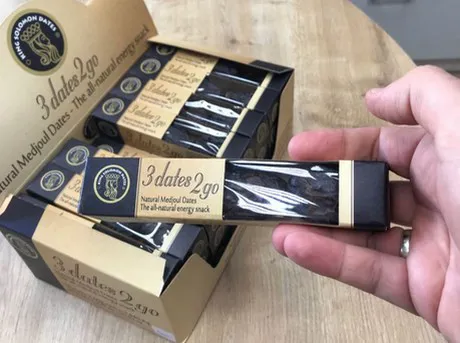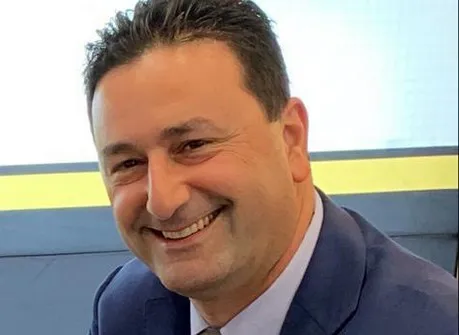The Medjoul season started two weeks ago. “I am proud to say we are starting the Medjoul season on time with almost no stock from last season,” says Yaniv Cohen from Hadiklaim. “This means the market can easily absorb the annual increase of this variety. It is too early to tell regarding the quality. It does, however, seem to be a good season with reasonable to good sizing. With Medjoul, the bigger the date, the better the quality.”
“We would like to be the first stop for Medjoul dates in the world,” says Yaniv Cohen. He is the Marketing Director for Hadiklaim Date Growers Cooperative in Israel. “Whether you are a wholesaler, a personal buyer, athlete, young or old - wherever you go, we hope you will see us. Of course, we will focus on Medjoul because this is the most requested variety.”
Hadiklaim, however, does not only market Medjouls. They have nine different varieties of dates. “In fact, we are starting with Bahri yellow dates. These are the only dates you can consume when they are yellow.”

Plans to increase supply
Hadiklaim has plans to increase the supply of Medjoul dates by ten to fifteen percent. “Hopefully, this will be around 15,000 to 16,000 tons of Medjoul,” says Cohen. This cooperative’s growers are expanding their orchards, and their tonnage year-on-year. “Every year more growers are joining our cooperative.
“These growers are our shareholders. We are merely their marketing arm. We handle the marketing in Israel and the other 40 countries we export to around the world. We deal with the largest supermarkets all over the world, including Tesco, M&S, and other supermarkets, in America.”
“We manage to sell good quantities in the US,” Yaniv continues. “We are mainly on the East Coast. We are, however, expanding. I think the demand in America far outweighs what it produces. As a matter of fact, we have received several inquiries to send Medjoul dates to California, even.
“It is absurd, but transport costs from Israel to New York are less expensive than from California to New York. So we have an advantage in this aspect. We have another advantage. We sell kosher dates to the Jewish community in New York. In Israel, we can produce dates that are certified as kosher.”

Different varieties
According to the MD, there are two ways to enjoy Medjoul dates. One variety dries on the tree. “It has a moisture level of about 25%,” he explains. “There is another type. These are picked and packed individually. It is the same date, but it is what we call the super-fresh Medjoul or Bonbon. These are handled totally different from regular Medjouls. You get two varieties of Bonbon too - Bonbon Blue and BonBon Black.”
What is interesting is that you can consume Bonbons while they are still frozen. “All Medjoul are stored at -18°C but you can store standard Medjouls at room temperature for three or four months without any problems. You can eat them at room temperature too. Bonbons, on the other hand, can be eaten frozen as well. We call it Nature’s ice cream. It has the texture of ice cream too but is less sweet. The main market for this variety is in France.”
The Hayani is a different variety of date. It originally comes from Egypt. It is grown in the north of Israel. “We do this variety too,” Yaniv says. Both the Hayani and Bonbon are stored, sold, and consumed frozen.”

No major developments
According to Cohen, there are no major developments in new or different date varieties. “We do see new varieties entering the market. I know there is a variety called Zamli coming in very low quantities from South Africa. I have heard they taste very good. There is another variety called Anbara, which is considered to be the biggest date in the world. It is a nice-looking, prestigious date.”
He does, however, see development in new, accessible packaging. There is larger, smaller, different packaging. “We have developed a packaging called ‘Three dates to Go”. It is the size of a chocolate bar. We are trying to promote it.”
Does Cohen consider Turkey and Egypt to be competition? “Turkey does not produce any dates at all. Egypt grows mainly Hayani dates. They are, however, planting a lot of Medjoul trees. We are aware of what is coming. We see it as a cloud on the horizon. Nevertheless, we are focusing on maintaining our reputation as a supplier of premium, good quality dates. This includes good post-harvest treatment, traceability, reliability, and packaging.”
“We would like to continue being considered for our high-quality dates. I believe by distinguishing ourselves regarding this aspect, it will help us to handle this competition that is coming. We are expecting competition from not only Egypt. He says Morocco is expanding a lot. “Dates are one of Morocco’s national investments.”

Still a lot of room to grow
The current worldwide supply of Medjoul dates is about 70,000 to 80,000 tons. “If Egypt and Morocco were to add double that, it would not be that much If compared to other products such as avocados. Millions and millions of these are sold every year.”
But every year, the worldwide supply of these increases. Global demand also increases annually. “Our goal is to see Medjoul dates in every house. For example, there are 8 million people in Israel. We estimate the Medjoul market in Israel to be at around 15,000 tons. A quarter of the global Medjoul supply is, therefore, sold to between 8 and 10 million people.
If you crunch the numbers, Yaniv does not think even 500,000 tons will not be enough to supply the world. “I believe global Medjoul consumption will gradually increase,” he concludes.

Yaniv Cohen, marketing director of Hadiklaim
For more information:
Yaniv Cohen
Hadiklaim
Tel: +972 (3) 6389555
Email: yaniv@hadiklaim.co.il
www.Hadiklaim.co.il
